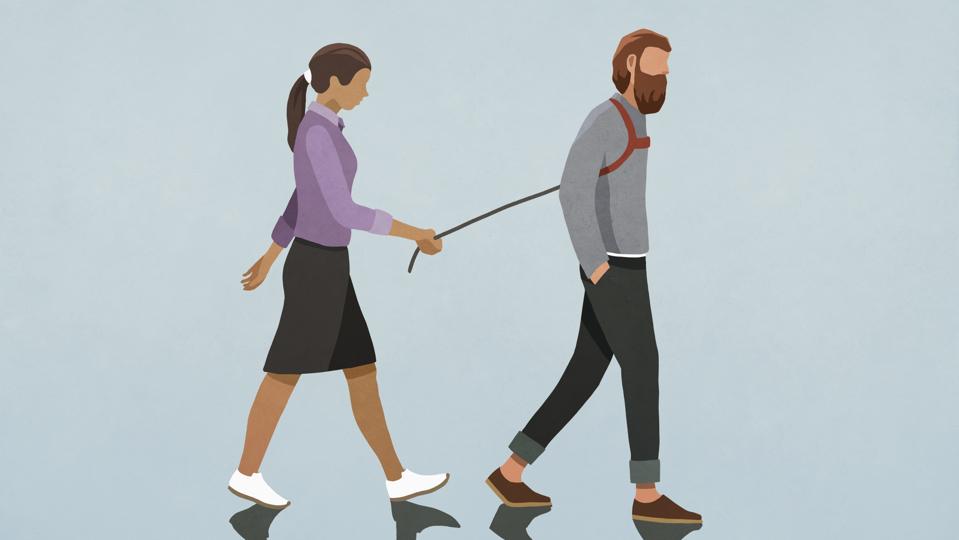Control is easy to spot when it’s harsh. But sometimes, what feels like love can also force you to keep someone else comfortable at your own expense.
getty
Control is often associated with dominance or overtly manipulative behaviors. However, there are different aspects to control, including some that are implicit. Such control may not rely on obvious ways of showcasing authority, but rather on subtle psychological mechanisms such as guilt or learned compliance.
Covert control doesn’t simply force you to submit. In many cases, it slowly conditions you to adapt.
A desire for power in a romantic relationship may not be the only reason why someone might be controlling. It can easily, and unknowingly, occur from their fear of uncertainty or some kind of insecurity. When love feels fragile, control can become a way to manage vulnerability or to keep closeness predictable.
No matter the reason, the impact on the person being controlled is always negative, regardless of whether it’s overt or subtle. An individual may start changing themselves in small ways to keep their partner happy, or indulge in their partner’s whims and fantasies to maintain a sense of harmony in the relationship.
Over time, these small accommodations can shift the balance of power and create unhealthy emotional dependence. Here are three common behaviors that often serve as subtle ways of control in intimate relationships.
1. Emotional Withholding
When someone weaponizes silence, guilt or subtle withdrawal instead of openly expressing their needs or frustrations, it might be their way of asserting control and getting their way without using any words.
For someone used to this behavior, this can feel like a temporary pause in communication or a normal disagreement. However, unbeknownst to them, it might be shaping how they behave in the relationship.
Here are other ways this form of cover control can manifest in a relationship:
- One partner may go silent instead of discussing a problem, and the other is left guessing what’s wrong
- One frequently feels guilty or anxious for things they might not have done
- Affection or attention might be withheld until one meets their partner’s unspoken expectations
In a 2022 study, researchers sought to understand why people use the silent treatment in relationships. To that end, they conducted in-depth interviews with 10 unmarried women, aged 20–27, to find out when and why they used the silent treatment in their relationships.
After analysis, the findings revealed that most participants used the silent treatment with close people whom they felt accept them unconditionally, such as their close friends or family. The findings also shed light on the combination of emotional triggers and power dynamics in close relationships that fuel use of the silent treatment:
- Violation of expectations. Participants used silence when their love, care or trust was not reciprocated, communicating hurt and frustration.
- Emotional blackmail. Silence was employed to elicit attention or reassurance from the target, reinforcing one’s sense of value in the relationship.
- Feeling undervalued. Participants remained silent when repeated attempts to communicate were ignored, as a defensive response to feeling unheard.
- Inability to express. Limited communication skills or fear of hurting others was one of the reasons that led participants to withdraw rather than speak up.
- Protective buffering or timeout. Silence was used by participants to manage overwhelming emotions or avoid escalating conflicts.
- Response to humiliation or displacement. Participants directed their silence toward trusted close others as a safe outlet for negative emotions.
- Punishment or reciprocal silence. Silence was also used as a way to punish undesirable behavior or in response to previous silence from the other person.
These findings help us understand that silent treatment or emotional withholding can often provide a sense of safety or an easy way to assert power. Due to its non-confrontational yet powerful nature, it’s also easy for this behavior to turn into a recurring unhealthy pattern.
2. Subtle Comparisons
If having been compared to someone (or something) made you change certain aspects of yourself or your behavior, it is possible you were being swayed through control. It might’ve sounded something like, “They’re so easy-going; I wish you were more like that,” or, “My ex never used to get upset over small things.”
It may seem harmless at first glance, or even feel like a call for motivation. However, over time, comparisons can only have a negative impact on the person who is on the receiving end.
In a 2024 scoping review aimed at defining and understanding subtle or covert abuse in adult intimate relationships, researchers analyzed data from a total of 19 studies and came to the following conclusions:
- Subtle abuse often appears minor or harmless, but serves to control or isolate partners. Even seemingly innocent behaviors can manipulate a partner’s emotions and sense of self, which helps gradually establish power over them.
- It includes behaviors like emotional withdrawal, silent treatment, casual put-downs or comparisons and guilt-tripping. These actions contribute to the undermining of confidence or pressuring the partner to change their behavior in a way that is desirable to the person in control.
- Most importantly, these behaviors can have serious psychological consequences. Victims often experience anxiety, lowered self-esteem and enhanced emotional dependency, all of which can accumulate over time and affect overall well-being and relationship satisfaction.
So, even seemingly casual comparisons fit quite squarely within the pattern of covert abuse. The bottom line here is to never underestimate or downplay the effects of your partner behavior on your psyche. You don’t have to panic or end the relationship immediately. However, if you think that your partner has covert controlling tendencies, then it’s worth bringing it up to them, to a trusted loved one or to a qualified professional.
3. Create Dependency
Some partners may initially appear supportive but gradually create reliance by becoming the main source of emotional support, or gently undermining your independence.
Take, for instance, a partner who always decides on your behalf what you should eat, which errands to run or how to spend your free time. Initially, they may seem “helpful” or “thoughtful.” However, as the pattern continues, the other partner may start doubting their own judgment and turn to their approval regularly, even for the smallest of judgments.
This dependence creates the perfect conditions for more insidious forms of psychological manipulation, such as gaslighting. A manipulative partner can start off by creating covert dependence, and then move to traps like distorting reality and asserting overt control
A 2025 study published in Personality and Social Psychology Review suggests that gaslighting works because it exploits normal social-cognitive mechanisms that humans rely on in close relationships. Mechanisms such as trusting others to confirm reality, seeking validation for self-views or simply relying on shared understanding with significant others. And in a relationship built on dependency, the gaslighter’s job becomes a lot easier.
Awareness alone can help individuals pause and make conscious choices before manipulation becomes entrenched. And with help, if needed, this can pave the way toward healthier and more balanced relationships.
Recognizing control begins with awareness. Take the Relationship Control Scale to understand how power and influence might be operating in your relationship.









